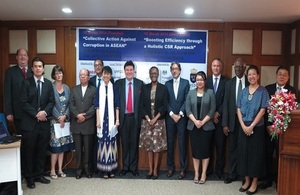Burma: Cleaning up for growth
UK support ASEAN-wide efforts to tackle corruption and improve private sector transparency

Forum on Business and Anti-Corruption in ASEAN
The British Embassy in Rangoon has reaffirmed its commitment to supporting transparent, ethical growth in Burma. Speaking at an event at the UMFCCI on 18 March, bringing together business leaders, professional organisations, corporate social responsibility (CSR) networks and international experts, Deputy Head of Mission Matthew Hedges said:
The UK has taken such a strong stance on corruption because we believe it is so harmful to economic growth and undermines the social fabric of societies. The vast majority of UK firms see corruption as an obstacle to doing business and will shy away from environments where it is not seen to be tackled effectively.
From an economic perspective, corruption distorts competitive markets and leads to the misallocation of resources. From a social perspective, it undermines the rule of law and public trust in politicians, public servants and business leaders. Every year, corruption adds as much as 10% to the total cost of doing business globally, 25% to the cost of procurement contracts in developing countries, and a shockingly high estimate of 5% of total global GDP. At a time of limited global growth, it is clear that tackling corruption makes economic sense, particularly in a country like Burma that needs sustainable, equitable growth.
The UK is pleased to be supporting the processes by which Burma can apply to join the Extractive Industries Transparency Initiative (EITI) and the Open Government Partnership (OGP). We have also recently concluded a series of UK-funded workshops to help improve the capabilities of the Financial Intelligence Unit and relevant government bodies to tackle money-laundering. All of these activities are helping to fulfil; the UK’s 2013 G8 Presidency commitment to supporting responsible investment into Burma.
Daw Khine Khine Nwe, Joint Secretary General of the UMFCCI, said:
This is all about social responsibility. A giver [of bribes] does not need to give and a taker does not need to take. If we all stop giving the takers will cease to exist. If we all stand firm the space for those who behave unethically will shrink and disappear.
Gerard Forlin QC, quest speaker at the conference, said:
Companies should not feel that they can cut corners in less strongly regulated environments. Regulators are watching the global picture and the noose is tightening. The UK, with its strong legislation, is not saying ‘we are better than the others’. The UK just got there first and it is the direction that the world is moving in.
Further information
This initiative falls under the UK Government’s ‘Prosperity’ agenda, which seeks, in partnership with local institutions, to increase exports and investment, open markets, ensure access to resources and promote sustainable global growth.
The 18 March event was facilitated by the ASEAN CSR Network, with the support of the United Kingdom’s Foreign and Commonwealth Office, and in partnership with the United Nations Office on Drugs and Crime (UNODC) and the United National Global Compact (UNGC). It formed part of a year-long initiative that provided opportunities for networking, exchange, training and partnership-building at the ASEAN regional level.
The event was based on the Global Compact’s 10th Principle that “businesses should work against corruption in all its forms, including extortion bribery”.
The British Embassy is grateful for the support of the Union of Myanmar Federation of Chambers of Commerce and Industry, as well as the participation of Global Compact Myanmar, Myanmar Business Executives Association, and theMyanmar Centre for Responsible Business.
The UK is the founding donor and biggest contributor (£0.6 million) to the Myanmar Centre for Responsible Business, which is working with business, civil society and government to determine what responsible business means in practical terms in this country. It is affiliated with the UK-based Institute for Human Rights and Business.
Speakers at the Forum Series include Mr. CHUA Cher Yak, former director of the Singapore Corrupt Practices Investigation Bureau, Mr. Gerard Forlin QC, a renowned lawyer and expert on the UK Bribery Act, Mr. Shervin Majlessi, Regional Adviser on Anti-Corruption of the UNODC, and Ms. Olajobi Makinwa Head of Transparency and Anti-Corruption Initiatives at the UN Global Compact.